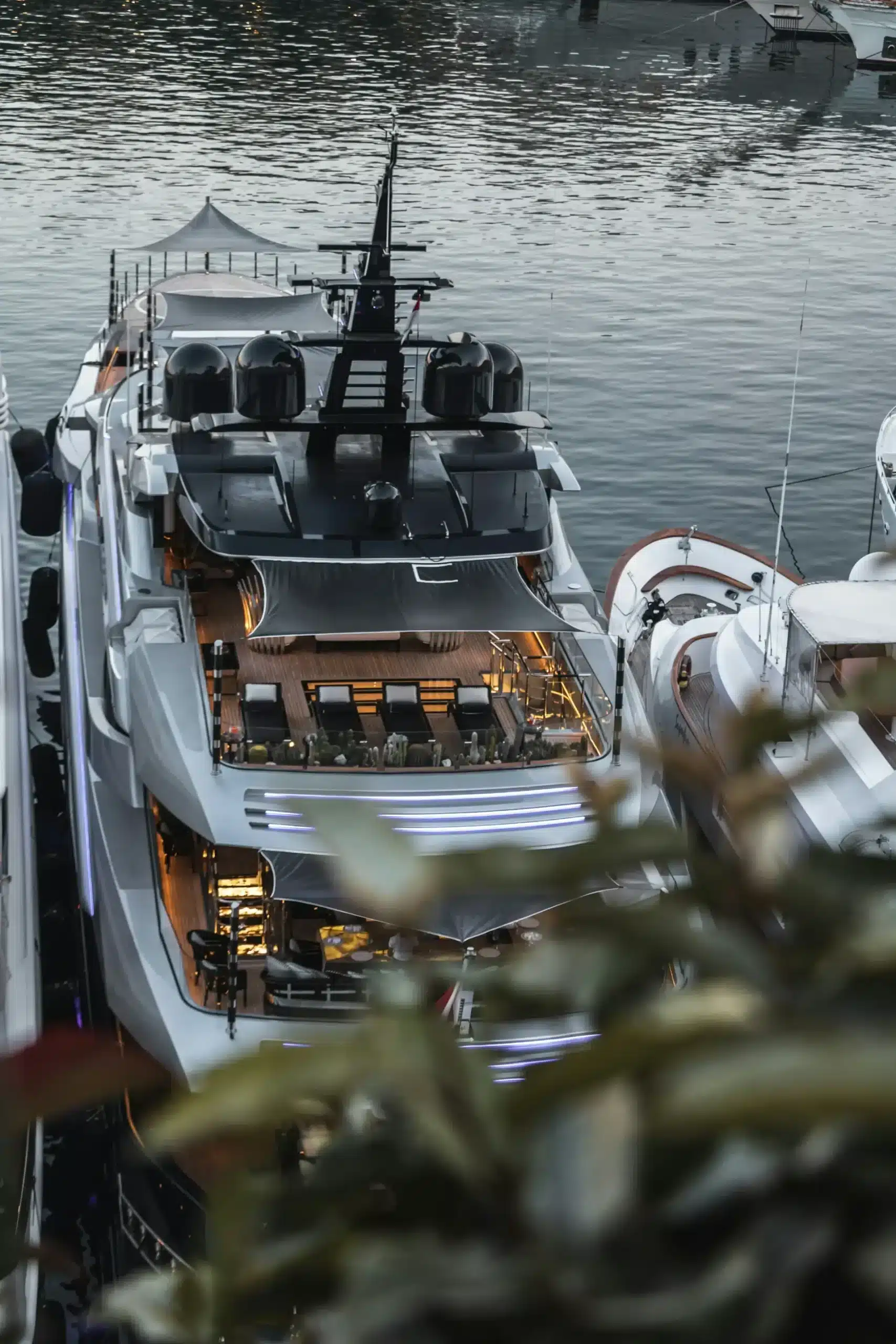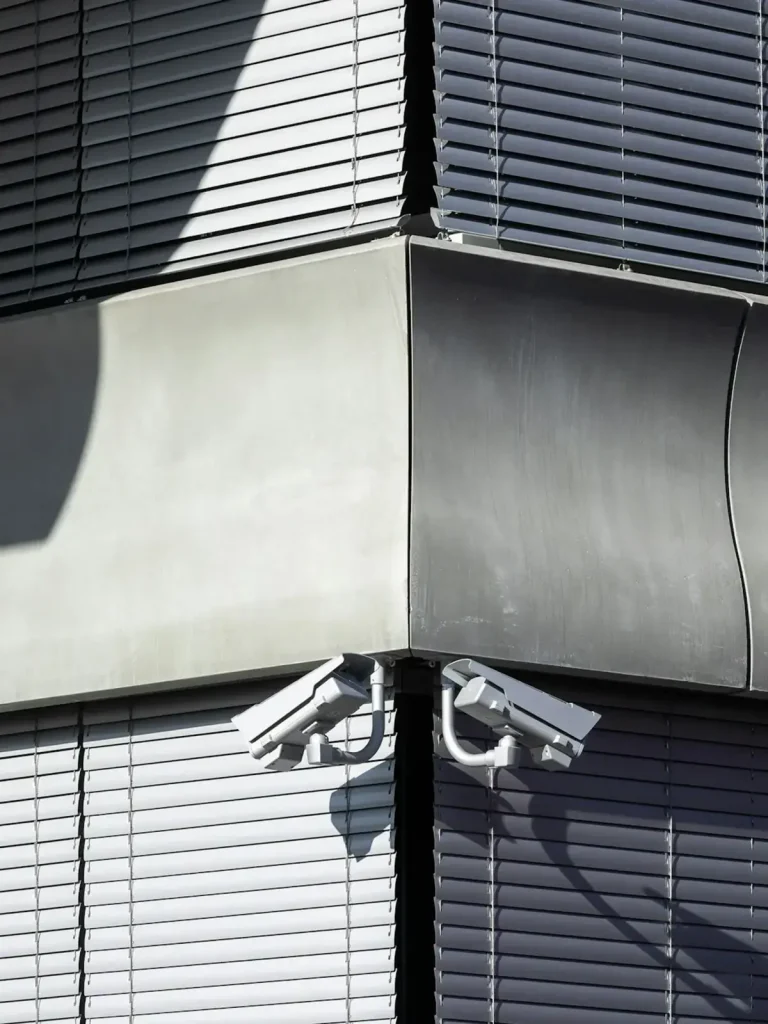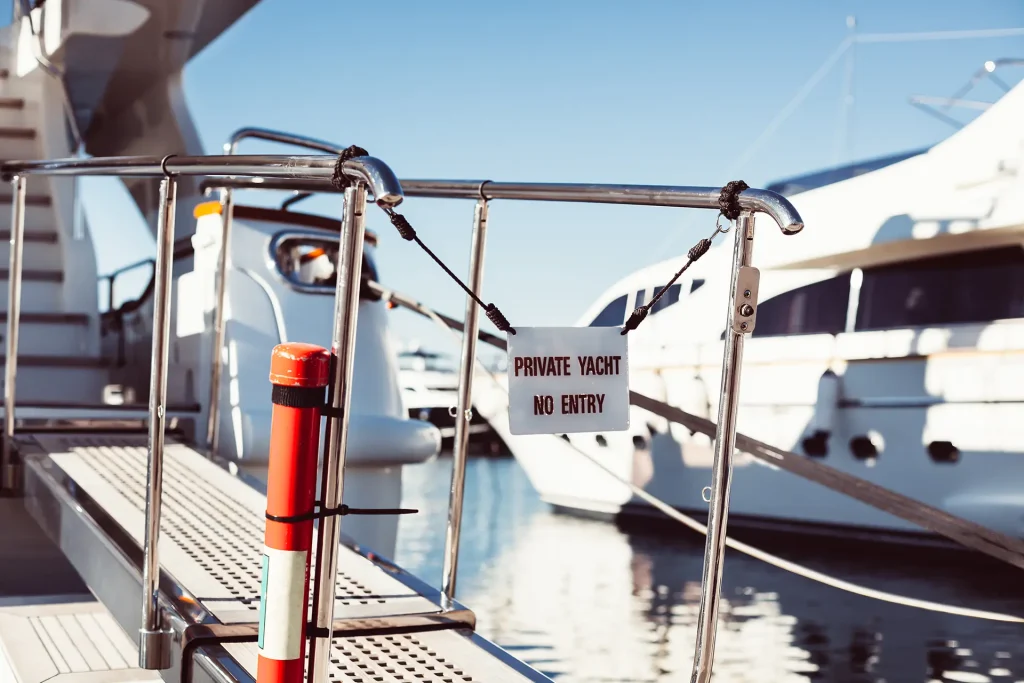Marina Security Services
At BluWater Marine Security, we provide tailored security solutions for marinas across the Caribbean. Our services ensure compliance with international standards like the ISPS Code and local maritime laws, enhancing safety for marina users. From 24/7 surveillance, vetted and trained personnel, to cutting-edge technology and emergency preparedness, we deliver reliable security that protects assets, visitors, and operations.
Partner with us for comprehensive security audits, consulting services, and personnel training to maintain a secure and compliant environment for your marina.
Marina Security Services for the Caribbean
At BluWater Marine Security, we provide tailored security solutions for marinas across the Caribbean. Our services ensure compliance with international standards like the ISPS Code and local maritime laws, enhancing safety for marina users. From 24/7 surveillance, vetted and trained personnel, to cutting-edge technology and emergency preparedness, we deliver reliable security that protects assets, visitors, and operations.
Partner with us for comprehensive security audits, consulting services, and personnel training to maintain a secure and compliant environment for your marina.
1. Business Registration and Licensing
- Company Registration: Register your business with local chambers of commerce or regulatory bodies, selecting the appropriate business structure (e.g., sole proprietorship, partnership, or private limited liability company).
- Business Licenses: Obtain relevant business licenses and operational permits specific to private security services from local authorities.
2. Security Service Authorization
- Ensure compliance with local private security regulations, including vetting processes, operational standards, and employee qualifications.
- Develop security protocols that align with both local laws and international standards, ensuring authorization to operate legally.

3. Maritime Security Compliance
- ISPS Code Adherence: Implement measures required under the International Ship and Port Facility Security (ISPS) Code, such as security assessments, plans, and physical measures.
- Recognized Security Organization (RSO) Status: Pursue RSO status to conduct security assessments and approve security plans for marina and port facilities.

4. Personnel Training and Certification
- Employee Vetting: Conduct thorough background checks on all employees to ensure integrity and trustworthiness.
- Specialized Training: Provide employees with maritime security training, emergency response skills, and customer service expertise tailored to marina environments.
- Certifications: Obtain internationally recognized certifications for employees, ensuring they meet industry standards.
5. Insurance and Liability Coverage
Liability Insurance
- Secure comprehensive liability insurance to protect against potential risks and claims arising from security operations. This coverage is essential for mitigating financial exposure from incidents during service delivery.
Employee Coverage
- Ensure employees are covered under:
- Workers’ Compensation Insurance: To cover medical expenses and lost wages in case of workplace injuries.
- Health Insurance: To promote employee well-being and retention.
- Having robust insurance policies in place demonstrates professionalism and a commitment to safety for both clients and employees.
6. Operational Infrastructure
Security Equipment
- Invest in essential security equipment, including:
- Surveillance Cameras: To monitor marina perimeters and activities.
- Communication Devices: Radios and other communication tools to ensure effective coordination.
- Patrol Vehicles or Boats: For patrolling large marina areas or waterfronts.
Standard Operating Procedures (SOPs)
- Develop comprehensive SOPs that outline:
- Protocols for handling unauthorized access, theft, or vandalism.
- Emergency response procedures for natural disasters, medical incidents, or security breaches.
- Routine patrol and monitoring activities.
- Align these SOPs with local regulations and international maritime security standards.

7. Stakeholder Engagement
Collaboration with Authorities
- Build strong relationships with:
- Local Law Enforcement: To coordinate responses to criminal activities or emergencies.
- Port Authorities and Maritime Organizations: To ensure compliance with maritime security requirements.
Community Relations
- Actively engage with the local community by:
- Hosting educational workshops on marina safety and security.
- Participating in community events to build trust and foster collaboration.
- A positive relationship with the community enhances the reputation and effectiveness of your security operations.
8. Continuous Improvement
Regular Audits and Assessments
- Conduct periodic security audits to:
- Identify vulnerabilities in infrastructure or protocols.
- Implement corrective measures promptly to address risks.
- Stay updated on emerging threats and adjust security strategies accordingly.
Employee Development
- Provide ongoing training opportunities for employees, covering:
- Advances in security technologies.
- Updates to international and local maritime security regulations.
- Best practices for customer service and conflict resolution.
- Encouraging continuous learning helps maintain a skilled and motivated workforce.
Thoughts
By addressing the key elements of business registration, licensing, compliance, personnel training, operational infrastructure, insurance, and stakeholder engagement, this marina security plan establishes a solid foundation for success. Continuous improvement and a proactive approach to security challenges will ensure your company not only meets regulatory requirements but also delivers superior service to marina users.
A well-executed plan will build trust with clients, strengthen partnerships with authorities, and create a safe and secure environment for all. Let me know if you’d like further assistance with specific implementation strategies!

9. Standards for Training Security Guards
Adopting well-established training standards for security guards is essential to ensure professionalism, competence, and adherence to international best practices. For marina security operations in the Caribbean, using Florida security training standards as a benchmark can provide a solid foundation, as Florida’s regulations are comprehensive and aligned with industry expectations.
Training Requirements Based on Florida Standards
- Basic Security Officer Training
- Minimum Training Hours: Florida requires 40 hours of basic security guard training, which can serve as a baseline for security personnel in the Caribbean
- Key Topics:
- Legal responsibilities and authority of security guards.
- Principles of patrolling and surveillance.
- Report writing and documentation skills.
- Emergency response protocols, including fire safety, medical emergencies, and natural disasters.
- Conflict resolution and de-escalation techniques.
- Specialized Training
- Maritime Security Modules: Incorporate International Ship and Port Facility Security (ISPS) Code principles into training, focusing on threats unique to marina and port environments.
- Crisis Management: Teach guards how to handle crises like unauthorized vessel entry, piracy, or environmental hazards.
- Cultural Sensitivity and Customer Service: Address the diverse clientele in the Caribbean marinas by training guards in effective communication and cultural awareness.
- Ongoing Education and Re-Certification
- Establish a requirement for periodic re-certification, similar to Florida’s mandate for annual requalification with firearms or other specialized skills.
- Provide access to advanced courses in cybersecurity, advanced surveillance systems, and threat detection technologies to keep skills up to date.
Implementation in the Caribbean
- Adopting Local Relevance
- Adjust training content to reflect Caribbean-specific security challenges, such as tropical weather events, high tourism traffic, and unique cultural dynamics.
- Incorporate local laws and regulations, ensuring all personnel understand their legal scope of authority.
- Collaboration with Training Providers
- Partner with security training institutions or academies in Florida to develop a training curriculum tailored to Caribbean marina needs.
- Explore online and hybrid training options to reduce costs and logistical barriers.
- Training Facilities
- Establish or collaborate with local training centers equipped with simulation environments for maritime security scenarios.
- Certification and Documentation
- Provide trainees with certificates of completion aligned with Florida’s standards, enhancing their credibility and ensuring compliance with international expectations.
Benefits of Adopting Florida Standards
- Enhanced Credibility: Adhering to Florida standards signals a commitment to international best practices, attracting high-value clients and partners.
- Improved Readiness: Comprehensive training ensures guards are well-prepared to handle a variety of scenarios, from routine patrols to high-stakes emergencies.
- Professionalism and Retention: Investing in training boosts guard confidence, job satisfaction, and retention, creating a more reliable workforce.
By incorporating Florida’s security guard training standards into your operations, you set a high benchmark for professionalism and effectiveness. This approach not only ensures compliance with global expectations but also establishes your marina security company as a trusted leader in the Caribbean. Let me know if you’d like further details or assistance in implementing this training program.

10. Audits and Consulting for Marina Security Across CARICOM Islands
Expanding your marina security services to include audits and consulting across CARICOM (Caribbean Community) islands provides an opportunity to establish yourself as a regional expert. This approach ensures that marinas throughout the region meet high standards of security compliance, safety, and operational efficiency while adhering to local and international regulations.
The Importance of Audits and Consulting in the Caribbean
- Compliance with Local and International Standards
- Many marinas in CARICOM member states must comply with the International Ship and Port Facility Security (ISPS) Code and local maritime laws. Audits ensure compliance, reducing risks of penalties or operational disruptions.
- Tailored Security Solutions
- Each island and marina have unique challenges, including geographic, environmental, and economic factors. Consulting services offer customized security plans that address these specific needs.
- Reputation Management
- High-profile marinas often cater to luxury yacht owners and international visitors. Regular audits and professional consulting enhance their reputation as safe and secure destinations.
Steps to Conduct Effective Marina Security Audits
- Pre-Audit Preparation
- Collaborate with marina management to identify key areas of concern.
- Gather information on the marina’s current security protocols, infrastructure, and personnel training.
- Review compliance with local maritime regulations and international standards such as the ISPS Code.
- On-Site Assessment
- Inspect physical security measures, including access control points, perimeter security, and surveillance systems.
- Evaluate operational procedures, such as visitor screening, emergency response plans, and incident reporting.
- Conduct interviews with security personnel to assess their training and awareness of protocols.
- Risk Assessment
- Identify vulnerabilities, such as unauthorized access points, insufficient lighting, or outdated surveillance equipment.
- Analyze risks specific to the marina’s environment, such as natural disaster preparedness or exposure to criminal activities like piracy or smuggling.
- Audit Report
- Provide a detailed report highlighting strengths, weaknesses, and areas for improvement.
- Include actionable recommendations for addressing identified vulnerabilities and enhancing overall security.
- Follow-Up and Continuous Monitoring
- Offer follow-up services to help marinas implement recommended changes.
- Schedule periodic audits to ensure sustained compliance and adaptability to emerging threats.
Consulting Services for CARICOM Marinas
- Comprehensive Security Planning
- Develop customized security plans tailored to the marina’s layout, clientele, and operational scope.
- Include contingency plans for natural disasters, criminal incidents, and other emergencies.
- Training Programs
- Offer training for security personnel, focusing on ISPS Code compliance, customer service, and emergency response.
- Provide workshops for marina management on best practices in security governance.
- Technology Integration
- Recommend and oversee the implementation of advanced security technologies, such as AI-powered surveillance systems, biometric access controls, and integrated communication networks.
- Regulatory Compliance Support
- Assist marinas in navigating the regulatory frameworks of their respective CARICOM nations.
- Act as a liaison between marina management and maritime authorities, ensuring smooth approval processes.
- Cross-Island Collaboration
- Facilitate partnerships between marinas in different CARICOM states to share resources, insights, and best practices.
- Create regional security networks to address common threats collectively
Key CARICOM Nations for Marina Security Services
Focus on providing services to major maritime hubs and islands with a high density of marinas, including:
- Antigua and Barbuda
- The Bahamas
- Barbados
- Grenada
- Jamaica
- Saint Kitts and Nevis
- Saint Lucia
- Saint Vincent and the Grenadines
- Trinidad and Tobago
- Guyana and Suriname (for riverside or port security)
Benefits of Regional Audits and Consulting
- Standardized Security Across CARICOM
- Establishing consistent security practices helps elevate the region’s reputation as a safe and reliable destination for maritime activities.
- Cost Efficiency
- Offering consulting services across multiple islands allows marinas to access expert guidance without the need for in-house security specialists.
- Enhanced Collaboration
- By working with local governments, law enforcement, and maritime authorities, your company can play a pivotal role in shaping regional security policies.
- Increased Revenue Streams
- Expanding your services to include audits and consulting diversifies your business model and creates opportunities for recurring income through long-term client relationships.
Final Thoughts
Offering audits and consulting for marina security across CARICOM islands positions your company as a regional leader in maritime safety and security. By ensuring compliance, enhancing operational efficiency, and fostering collaboration, you can help marinas create safe and secure environments that attract high-value clients and promote the Caribbean as a world-class maritime destination.
Have Question?
Contact Us!
Email Us
Call Us
Our Address
Puerta del Sol Plaza | Welfare Road #68, Ste. 301/302
Simpson Bay, Sint Maarten
Working Hours
Monday – Friday,
9:00 am – 5:00 pm
Contact BluWater™ Marine Security for Reliable Marina Protection
Have questions about securing your marina? We’re here to help. Reach out to BluWater™ Marine Security to learn more about our tailored solutions for marina safety and compliance. Fill out our contact form, call us, or send an email, and our expert team will be happy to assist you with your security needs.









